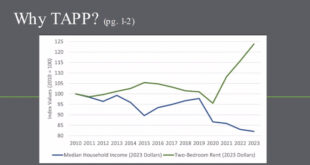Looking at everything …including fee on STRs?
By Mark Reaman
The Crested Butte planning staff has started an effort to update the affordable housing fees charged to developers when they build projects in town.
Last updated in 2010, the Residential Occupied Affordable Housing (ROAH) program was implemented to create and preserve affordable housing in response to increased housing demand caused by the jobs generated by new development. In other words, if a hotel was built, housing for housekeepers and front desk clerks was to be considered. To that end, formulas were developed to determine how many jobs were generated through various types of developments. Ultimately, the generation number is combined with a housing mitigation rate which results in a number of needed ROAH housing units charged to each development.
In a report to the town council, community development director Troy Russ said since ROAH began 15 years ago, the town has gained five ROAH units and collected $1.3 million in payment-in-lieu fees. Councilmember Anna Fenerty wanted those figures put into some context. “More than anything it reflects the slow pace of development in a small town,” Russ said.
Russ said that the ROAH fees could be used to incentivize more deed restricted units in town but made clear that the fees were “not an affordable housing cure but it is another arrow in our quiver.”
Mayor Ian Billick said, given costs of new construction, he would be in favor of using ROAH to incentivize conversion of free-market condominiums to deed restricted units. Councilmember Jason MacMillan said his feeling was that ROAH fees should be higher, but he was not sure how much higher. “It is a balance where you don’t want the ROAH so high it encumbers developers to the point there is no more development in town,” he said.
Russ said the review is just beginning and his staff will evaluate other communities to discover alternatives. He pointed out that in some communities, short-term rental (STR) licenses include a ROAH payment given the job generation the use creates.
Staff will evaluate a number of questions and come back to council with updates and ask for guidance for direction with recommendations. The goal is to have an updated ROAH program approved by ordinance in November.
 The Crested Butte News Serving the Gunnison Valley since 1999
The Crested Butte News Serving the Gunnison Valley since 1999



